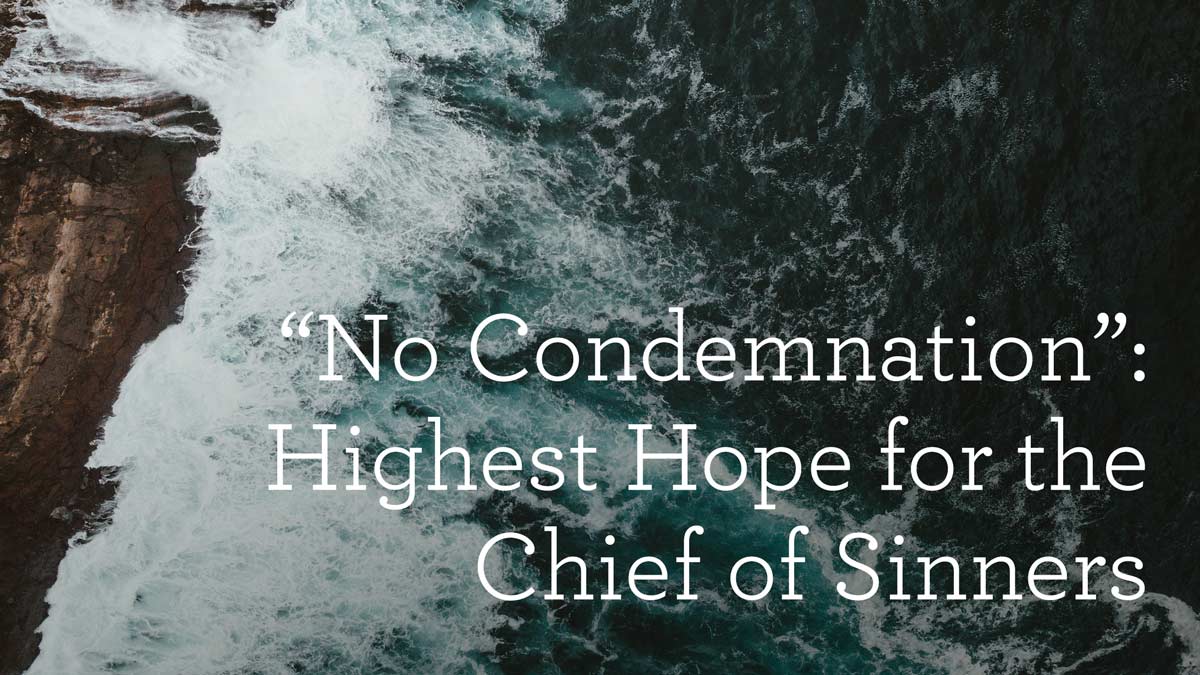
The entirety of the Bible is inspired Scripture—every book, every paragraph, every sentence, every word. But while all Scripture is equally inspired, some parts of it exceed the others in being inspiring.
Romans 8 is one of those chapters that is simply astounding—breathtaking in its scope and brimming over with Gospel truth. It is one of the highest peaks in all of Scripture. It is worth much meditation, and even memorization. The first verse—a mere thirteen words in English—contains enough glory to keep us digging for quite a while:
There is therefore now no condemnation for those who are in Christ Jesus.
Serious Sin, Greater Grace
Notice, first, the “therefore” at the beginning of the verse. As our grammar teachers have taught us, we must always ask what a therefore is there for. In this case, the conjunction points us back at least to the end of chapter 7, but it could also be pointing us all the way back to include what Paul has written from chapter 3 on.
In a sense, though, where the “therefore” points us specifically is moot, because Paul has been building a cumulative, rigorous argument throughout the letter. We might paraphrase it like this: Therefore, in light of what I’ve just said and in light of all that I’ve said, you need to know this. And what do we need to know? That there is no condemnation for believers!
And just like that, we are into deep waters, into the depths of God’s grace.
Paul had just written in 7:24, “Wretched man that I am! Who will deliver me from this body of death?” Given what we know about ourselves, given what God knows about us, given that I don’t do the good that I want to do and I end up doing the bad I don’t want to do (see Rom. 7:18–20), what hope is there for me? Therefore, Paul tells us, what you need to know is, in light of all of that, there is no condemnation.
Sin is the great problem. It seduces and deceives and ultimately condemns (7:11). It whispers a promise of satisfaction. But that promise is a lie. Though we were stuck in sin’s deception before Christ and we yet wrestle with its effects, Jesus Christ has dealt decisively with our sin. According to Romans 8:3, God “condemned sin in the flesh.” He did so at the cross, where Christ “himself bore our sins in his body on the tree” (1 Pet. 2:24). Romans 7 tells us that we will yet struggle with sin and that it can make us feel weak and guilty—make us feel like failures. But through Christ and His Gospel—the “no condemnation” news of Romans 8—we can know that we are loved, safe, and secure.
J. I. Packer writes,
Think of the Christian’s personal life as a house with different aspects. Romans 7 depicts the cold, shadowed side that faces away from the sun, Romans 8 shows us the warm side where the sunshine is seen and felt. We only get out of Romans 7 into Romans 8 in the sense that, after letting the law speak to us about ourselves, we listen afresh to the gospel.1
We must let the law speak and confront us with our sin. But in Christ, the Gospel always has the final word.
From Death to Life
One thing we must be perfectly clear on is that the status of “no condemnation” is not just something we aspire to and reach eventually. Paul says this blessed state is for now. He’s referring not to a future possibility but to a present certainty.
We stand in grace. Where would we stand otherwise?
Romans 5:1–2 is another great therefore text in the Epistle to the Romans that helps us understand our present circumstance before God:
Therefore, since we have been justified by faith, we have peace with God through our Lord Jesus Christ. Through him we have also obtained access by faith into this grace in which we stand.
We stand in grace. Where would we stand otherwise? If we don’t stand in grace, we stand in condemnation. If we are not justified, if we are not declared righteous on the strength of Christ, we are condemned. There’s no safe territory between these. We’re not born into some moral middle ground whereby we choose either to live in condemnation or to live in justification. We find ourselves in the condemned category from the get-go: Adam has brought down the human race, and in him we all deserve death (Rom. 5:12–14; 1 Cor. 15:22).
But for a sinner who turns in repentance and faith to Jesus, our present reality is transformed to a living hope: God moves us from death to life through the resurrection of His Son. It is a sure and certain hope. The divine transaction is done, finished in the sacrifice of Christ once for all (Heb. 10:10).
Where You Want to Be
Not everyone takes part in the riches of no condemnation. As Romans 8:1 tells us, it applies specifically to those “in Christ Jesus.”
If we tally up our sins and compare them to our obedience, we’re always losing. It’s not even a competition, really. It’s like a pro team facing off against junior varsity. Still, many of us fool ourselves into thinking we have time to come back, to fix ourselves up, before the final whistle blows. Such thinking misses the Gospel entirely. Only by Christ’s achievements do we have any hope to enjoy liberation from sin and guilt. In the words of Ephesians 2:8, salvation “is not your own doing; it is the gift of God.”
If we tally up our sins and compare them to our obedience, we’re always losing.
When you really understand the Gospel, you may find yourself saying, Well, this is too good to be true! I mean, what is this? I don’t deserve this! And that’s how you should feel, every moment of every day! God gives such extravagant grace to the poorest of sinners like us. But that is exactly the point: our salvation is a gift of God’s grace. We could never deserve it, but God has mercy on us regardless. He sets His love on us and refuses to let us go—all because He has placed us in Christ Jesus. There’s no better place in all the world to be.
This article was adapted from the sermon “In Christ Jesus” by Alistair Begg.
1 J. I. Packer, Keep in Step with the Spirit (Leicester: Inter-Varsity, 1984), 129.
Topics: Articles
